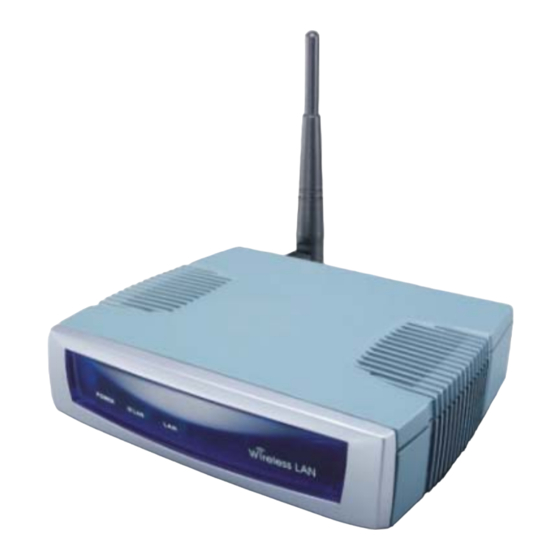
Table of Contents
Advertisement
Advertisement
Table of Contents

Summary of Contents for SENAO NL-2611CB3 PLUS
- Page 1 Wireless Multi-Client Bridge User’s Manual Version: 1.0...
-
Page 2: Table Of Contents
Wireless Multi-Client Bridge Version 1.0 Table of Contents INTRODUCTION ........................4 & B ..................... 4 EATURES ENEFITS ......................5 ACKAGE ONTENTS ........................5 PPLICATIONS ....................6 ETWORK ONFIGURATION UNDERSTANDING THE HARDWARE .................. 8 ..................... 8 ARDWARE ONFIGURATION ....................8 ARDWARE NSTALLATION PC CONFIGURATION...................... - Page 3 Wireless Multi-Client Bridge Version 1.0 Revision History Version Date Notes November 05, 2003 Initial Version Page 3 of 18...
-
Page 4: Introduction
Wireless Multi-Client Bridge Version 1.0 1 Introduction The Wireless Multi-Client Bridge is an Ethernet based Wireless Client Adapter. It provides wireless connectivity when connected to an Ethernet port of a PC. It is a driverless hardware, and does not require any driver/software to establish wireless connectivity. -
Page 5: Package Contents
Wireless Multi-Client Bridge Version 1.0 1.2 Package Contents Open the package carefully, and make sure that none of the items listed below are missing. Do not discard the packing materials, in case of return; the unit must be shipped in its original package. One Multi-Client Bridge One TNC-Reverse Antenna One Power Adapter... -
Page 6: Network Configuration
Wireless Multi-Client Bridge Version 1.0 1.4 Network Configuration To better understand how the wireless LAN products work together to create a wireless network, it might be helpful to depict a few of the possible wireless LAN PC card network configurations. The wireless LAN products can be configured as: a) Ad-hoc (or peer-to-peer) for departmental or SOHO LANs. - Page 7 Wireless Multi-Client Bridge Version 1.0 b) Infrastructure Mode The infrastructure mode requires the use of an access point (AP). In this mode, all wireless communication between two computers has to be via the AP. It doesn’t matter if the AP is stand-alone or wired to an Ethernet network.
-
Page 8: Understanding The Hardware
Wireless Multi-Client Bridge Version 1.0 2 Understanding the Hardware 2.1 Hardware Configuration RJ-45 Ethernet Connector – Provides 10 Mbps connectivity to a wired Ethernet LAN. Reset Button – By holding this down for more than five seconds, the unit will reset to its factory default settings. Power Supply Connector –... -
Page 9: Pc Configuration
Wireless Multi-Client Bridge Version 1.0 3 PC Configuration Follow the steps below in order to configure the TCP/IP settings of your PC. A. In the Control Panel double click Network Connections, and then double click on the connection of your Network Interface Card (NIC). You will then see the following screen. - Page 10 Wireless Multi-Client Bridge Version 1.0 C. Select Use the following IP address radio button, and then enter an IP address and subnet mask for your PC. Make sure that the device and your PC are on the same subnet. D. Click on the OK button, your PC’s TCP/IP settings have been configured. Page 10 of 18...
-
Page 11: Web Configuration
Wireless Multi-Client Bridge Version 1.0 4 Web Configuration 4.1 Logging In To configure the Bridge through the web-browser, enter the IP address of the Bridge into the address bar of the web-browser (default IP: 192.168.1.1), and press Enter. You will then see the login window. Enter admin as the User name and leave the Password field blank, then click on the OK button. -
Page 12: System
Wireless Multi-Client Bridge Version 1.0 4.2 System The System page is the first page that is displayed after logging in. This page displays information about the AP and Bridge. You may refresh this page by clicking on the System link on the left-hand side of the page (image left). Described below is the information listed along with an image. -
Page 13: Wireless
Wireless Multi-Client Bridge Version 1.0 and displays the SSID, MAC address, channel number, signal strength, and mode of Access Points of Stations in the area. 4.3 Wireless Click on the Wireless link on the navigation bar in order to configure the wireless settings of this Bridge. The page displays the current wireless settings and allows you to make changes as you choose. - Page 14 Wireless Multi-Client Bridge Version 1.0 field blank means using the SSID “any” and connecting to an Access Point with the strongest available signal. Channel: select a channel from the drop-down list, which is the shared channel among all points in a point-to-point mode. The permissible channels depend on the regulatory domains.
-
Page 15: Admin
Wireless Multi-Client Bridge Version 1.0 4.4 Admin Click on the Admin link on the navigation bar in order to configure the threshold values and login details. You may also reboot this device and reset the setting back to the factory defaults. Described below along with an image are details on how to configure the administrative settings. -
Page 16: Ip Address
Wireless Multi-Client Bridge Version 1.0 4.5 IP Address Click on the IP Addr link on the navigation bar in order to configure the local IP and DHCP settings. Described below along with an image are details on how to configure the IP settings/DHCP settings. -
Page 17: Stations
Wireless Multi-Client Bridge Version 1.0 4.6 Stations Click on the Stations link on the navigation bar in order to view a list of stations connected to this Bridge. The image below depicts an example of a Bridge table. Page 17 of 18... -
Page 18: Appendix A - Specifications
Wireless Multi-Client Bridge Version 1.0 Appendix A – Specifications General Data Transfer Rate 11, 5.5, 2 and 1 Mbps, Auto Fall-Back Frequency Band 2.400~2.484 GHz Range (open environment) 11 Mbps –300m/450m ( 23 dBm output power) 5.5 Mbps –400m/600m ( 23 dBm output power) 2 Mbps –...



Need help?
Do you have a question about the NL-2611CB3 PLUS and is the answer not in the manual?
Questions and answers